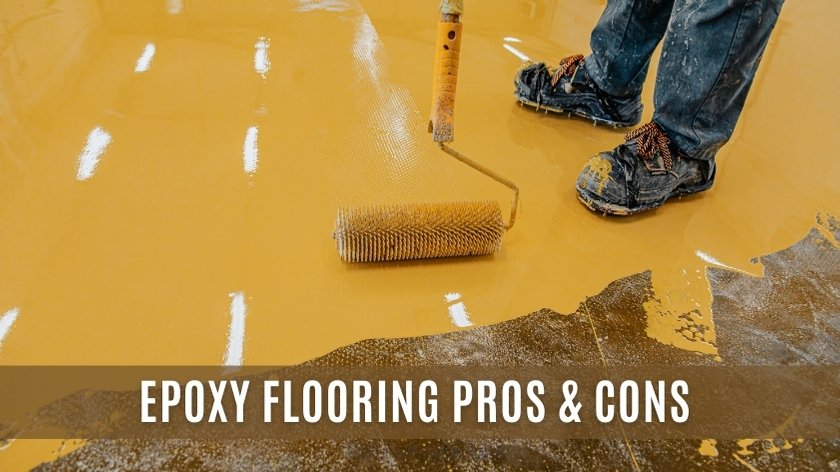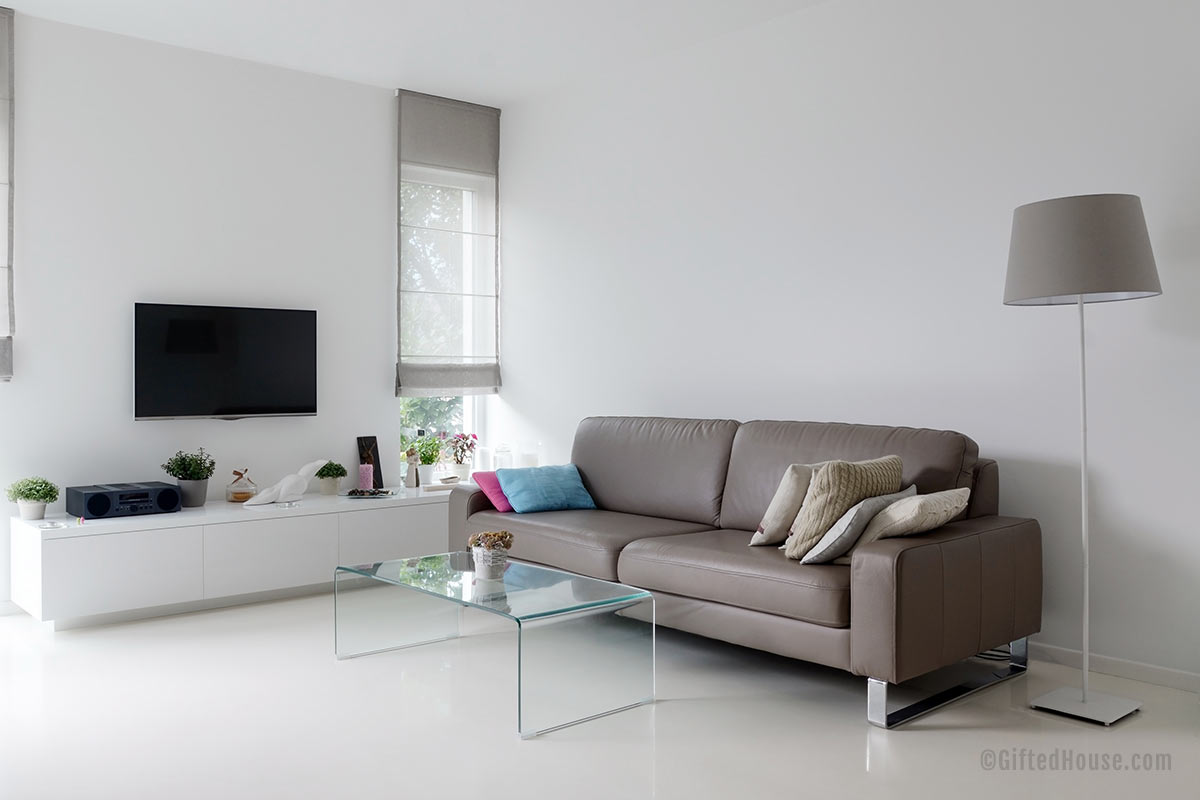Epoxy flooring is a popular choice for commercial spaces but has some disadvantages. It releases chemical fumes whilst being installed, often tunes yellowish over time, and can be slippery when wet. Due to its cold, clinical aesthetic, it is not a popular choice in the home.
What is Epoxy Flooring?
Epoxy flooring is made from Epoxy resin. It is usually used in commercial spaces exposed to heavy equipment or traffic. You will usually see Epoxy flooring in places such as hospitals, large entrance halls, or shops.
It is rare to see Epoxy flooring in the home as it is not considered a comforting or homely style of flooring. It may seem like the right choice, as it can withstand heavy traffic, other more aesthetically pleasing options will suit your interior design.
Take a look at the pros and cons of Epoxy Flooring:
Advantages of Epoxy Flooring
Cost-effective:
Epoxy flooring is easy to install, and because the floor itself is made of resin, the cost of the process is cheaper than other flooring options. However, remember that the pre-application process you will need to undergo may be expensive and time-consuming, so be sure to incorporate that into your consideration.
Durability:
As discussed above, Epoxy Flooring is durable and long-lasting. The surface will need to be adequately cleaned, and may benefits from another epoxy coat occasionally for upkeep.
Cleaning
The main advantage of Epoxy flooring is that it is straightforward to clean; this is why it is often used in business or industrial settings. Most Epoxy flooring is resistant to chemicals, solvents, and oil, making it an all-around safe option.
Disadvantages of Epoxy Flooring
The Appearance
In some circumstances, Epoxy Flooring can look highly appealing. Its simple and shiny finish can look clean and professional in large office buildings or commercial spaces. It’s great for brightening up cold hallways or large rooms due to its bright finish.
However, in a homely setting, Epoxy Flooring can feel cold and clinical. As it is used in spaces that need to be regularly cleaned and are used for business, not pleasure, Epoxy flooring lacks personality and comfort in the home.
Preparation:
Preparing the floor for epoxy flooring is a hard job. The concrete surface will need to be thoroughly cleaned and oil-free or grease-free. You will need to fill all cracks and remove any lumps or bumps.
The preparation work is time-consuming and tedious. Although there is a wide availability of tools on the market or services you can use to help you get the job done swiftly, it may be a costly process.
Bubble Formation:
As moisture gets into the flooring, there’s a high chance of bubble formation. Bubble formation will ruin the effect of the smooth Epoxy Flooring surface. This causes the floor to look uneven and unkempt; eventually, you will need to repair the surface.
Color
Once you get epoxy flooring, you cannot customize it. Although you can sprinkle paint or flakes into the resin whilst it’s drying, the Epoxy Floor will take the floor’s coloration underneath. Epoxy tends to fade or become yellowish when being directly exposed to sunlight.
Slippery when Wet:
As you clean the floor surface, you will be unable to walk on it because it is highly slippery. If you spill water or liquid onto the surface, it must be cleaned as you may fall and might hurt yourself.
Health Effects
When being installed, the harsh fumes of Epoxy boil down to a strong smell and may cause allergic reactions. The fumes can be toxic too and may cause side effects to you if you’re around. If you’re asthmatic, the irritation could be hard to bear.
Several studies have shown the adverse effects of Epoxy on the heart, lungs, and eyes. It’s said that Epoxy can harm in a similar way to that of alcohol. Skin cancer is also a disease thought to be caused by Epoxy.
While epoxy flooring is being installed, you need to stay away for some time. After its application, it is safe to be around.
Epoxy Flooring vs. Polished Concrete vs. Tiles
Polished concrete and tiles are the go-to options for homes, whilst commercial spaces may opt for Epoxy Flooring because of its easy-to-clean attributes.
Epoxy Flooring
Epoxy flooring is suitable if you’re keen to protect the floor beneath. Plus, the shiny appearance may be a look you find appealing. But it’s important to note that epoxy flooring is a temporary solution. After some time, you’ll be forced to get a new coat of Epoxy. Otherwise, the cracks can widen, and then the repairing costs will sky-rocket.
Epoxy Flooring is durable and offers excellent longevity. But family homes often avoid epoxy flooring due to its cold, clinical look and the fumes released whilst installing.
Polished Concrete
Polished concrete is an excellent option for all sorts of premises. The surface is perfect when it comes to stain resistance. Plus, you can also remove the stains efficiently and conveniently.
As well as being a stylish option for the modern home, it’s very durable too. Once you install Polished Concrete, the maintenance costs would be extremely minimal.
Unlike Epoxy Flooring, a Polished Concrete surface would not be harsh on your eyes, nose, or throat. There’s no chemical involvement. Hence, you won’t need to be vacant for the application.
Also, Epoxy Flooring is known to form bubbles. But, a Polished Concrete surface will not create any bubbles or store moisture. Nonetheless, it would help if you made sure that the surface is fully sealed.
Tiles
Tile Flooring is a popular choice for many homeowners. They are popular in the kitchen and bathroom areas, as they are durable, easy to clean, and stylish.
There are lots of tiling options available, from material to color. Tiles are easily customizable and can be personalized to fit your home.
There are no harsh chemicals used while installing tiles. So, you won’t feel any irritation in your eyes, nose, or throat.


